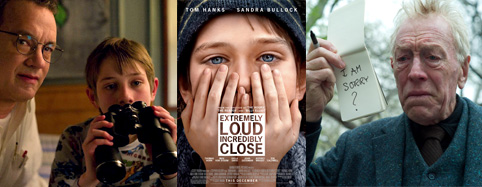
 D
D6/10
 Z
Z7/10
 B
BThe biggest tearjerker of the year goes to Extremely Loud and Incredibly Close. This emotionally charged film tells the story of a young boy with mild autism who tries to make sense of the loss of his greatly adored father to the fall of the World Trade Towers on September 11, 2001. The boy Oskar finds a key hidden in a vase in his father's closet which he believes will lead him to discover more about his father if he can find the lock that it goes to. With only the name Black on the envelope and a clipping from a newspaper that has "never stop looking" circled, the boy goes on a journey that leads him to overcome his fears and find peace. In his search, Oskar explores the lives of many people in a large community who greatly differ from one another, yet share a common tragedy.
This is a beautifully poetic story about tragic loss and overcoming the internal turmoil that follows. Though the story focuses on a single event in history, the importance lies in the humanity behind the tragedy. Everything is magnified and illuminated through the vessel of the supersensory vantage point of an autistic child. The film uses great editing and soft focus shots combined with icy colors to amplify the loneliness and vividness of Oskar's perspective. Alexander Desplat's gorgeous scoring moves the film and adds to the almost magical yet sad journey. Viola Davis and Max Von Sydow turn in magnificently tender supporting performances, and though slightly irritating at times, the boy lead, played by Thomas Horn, is wholly appropriate in his choices and gives a completely convincing heart-wrenching performance.
9/10
